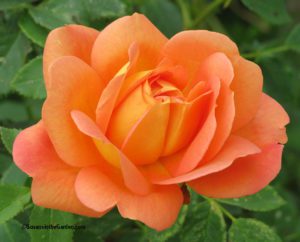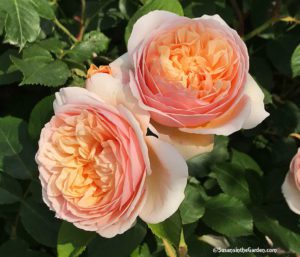 I recently received an excellent question from a reader asking about the hardiest roses one can grow, particularly in regions with very cold winters. Here’s Marcie’s question:
I recently received an excellent question from a reader asking about the hardiest roses one can grow, particularly in regions with very cold winters. Here’s Marcie’s question:
“In a recent posting, you mentioned roses that grow well in cold climates with something about the kind of root system they have. I live in Eastern Iowa and our winters can be brutal. I’m fond of David Austin roses, but I’ll bet these are not what you are talking about. Any clue as to what the roses might be?“
Marcie’s memory is correct in that a rose’s hardiness has so much to do with their root system. Here in my zone 5 garden, I only grow own-root (or non-grafted) roses because it makes all the difference. Here’s why:
Most nurseries only sell grafted roses. A grafted rose is a combination of two plants: 1) the rootstock and 2) the cultivar that we gardeners select at a nursery. Perhaps it’s ‘Peace’, or ‘Double Delight’ or ‘Graham Thomas’, for example.
Rose breeders start with a rootstock that has desirable traits. Then they take a scion (a young shoot) of the cultivar and graft it onto that rootstock. Breeders have been successfully grafting roses for eons. But here’s the problem:
For those of us living in regions where the winters get very cold, the graft union (where the scion was joined to the rootstock) is a weak point on the plant. If we have a particularly cold winter, you can lose the cultivar (again, ‘Peace’ or ‘Graham Thomas’ for example). But the following next spring, the rootstock sends up new shoots.

‘Sweet Juliet’, a David Austin rose.
That might cause you to rejoice, thinking the rose has survived the winter. But once those shoots start blooming, you’ll be seeing completely different (and usually underwhelming) flowers. Those flowers are from the rootstock. One of the most frequently used rootstocks here in the States is ‘Dr. Huey’. I’m certain you’ve seen them because many folks have roses with small red flowers… which means the cultivar died and the ‘Dr. Huey’ rootstock is blooming its heart out! (and, I should add, many gardeners are perfectly happy with those flowers.)
OK, so what’s a gardener to do, if they only want to grow the cultivars they purchased? (which is the majority of us)
Well, if you live in a cold climate, I heartily recommend purchasing own-root, non-grafted roses. This refers to roses growing on their own roots, rather than being grafted.
Here in Spokane, Wash., the best source is
Northland Rosarium. Fortunately, they also have a mail-order business so you can buy their roses even if you don’t live in this area. I have placed a link to their website from their name above. Northland Rosarium has an excellent selection
and an excellent reputation.
And for those of you who are absolutely crazy about David Austin roses (I’m in that club, too!), they sell own-root David Austins as well.
Thanks, Marcie, for your great question. And I hope everyone else has found this to be helpful.

 I recently received an excellent question from a reader asking about the hardiest roses one can grow, particularly in regions with very cold winters. Here’s Marcie’s question:
I recently received an excellent question from a reader asking about the hardiest roses one can grow, particularly in regions with very cold winters. Here’s Marcie’s question:
